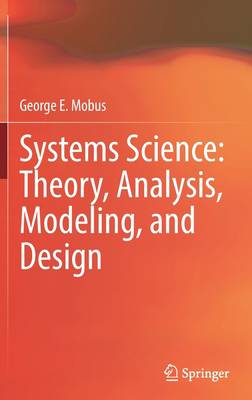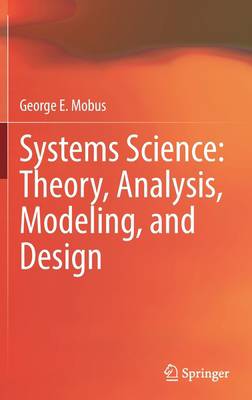
Door een staking bij bpost kan je online bestelling op dit moment iets langer onderweg zijn dan voorzien. Dringend iets nodig? Onze winkels ontvangen jou met open armen!
- Afhalen na 1 uur in een winkel met voorraad
- Gratis thuislevering in België vanaf € 30
- Ruim aanbod met 7 miljoen producten
Door een staking bij bpost kan je online bestelling op dit moment iets langer onderweg zijn dan voorzien. Dringend iets nodig? Onze winkels ontvangen jou met open armen!
- Afhalen na 1 uur in een winkel met voorraad
- Gratis thuislevering in België vanaf € 30
- Ruim aanbod met 7 miljoen producten
Zoeken
€ 147,95
+ 295 punten
Uitvoering
Omschrijving
This book describes a comprehensive approach to applying systems science formally to the deep analysis of a wide variety of complex systems. Detailed 'how-to' examples of the three phases (analysis-modeling-design) of systems science are applied to systems of various types (machines, organic (e.g. ecosystem), and supra-organic (e.g. business organizations and government). The complexity of the global system has reached proportions that seriously challenge our abilities to understand the consequences of our use of technology, modification of natural ecosystems, or even how to govern ourselves. For this reason, complex mathematics is eschewed when simpler structures will suffice, allowing the widest possible audience to apply and benefit from the available tools and concepts of systems science in their own work. The book shows, in detail, how to functionally and structurally deconstruct complex systems using a fundamental language of systems. It shows how to capture the discovered details in a structured knowledge base from which abstract models can be derived for simulation. The knowledge base is also shown to be a basis for generating system design specifications for human-built artifacts, or policy recommendations/policy mechanisms for socio-economic-ecological systems management. The book builds on principles and methods found in the authors' textbook Principles of Systems Science (co-authored with Michael Kalton), but without prerequisites. It will appeal to a broad audience that deals with complex systems every day, from design engineers to economic and ecological systems managers and policymakers.
Specificaties
Betrokkenen
- Auteur(s):
- Uitgeverij:
Inhoud
- Aantal bladzijden:
- 814
- Taal:
- Engels
Eigenschappen
- Productcode (EAN):
- 9783030934811
- Verschijningsdatum:
- 10/03/2022
- Uitvoering:
- Hardcover
- Formaat:
- Genaaid
- Afmetingen:
- 156 mm x 234 mm
- Gewicht:
- 1338 g

Alleen bij Standaard Boekhandel
+ 295 punten op je klantenkaart van Standaard Boekhandel
Beoordelingen
We publiceren alleen reviews die voldoen aan de voorwaarden voor reviews. Bekijk onze voorwaarden voor reviews.











